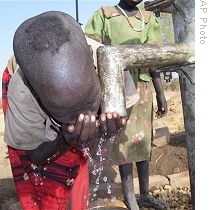Nairobi
16 November 2009
A German human rights group reports an oil company in southern Sudan is contaminating drinking water. The group warns that if left unchecked the pollution could lead to an ecological catastrophe in one of the world's largest swamplands.
 |
| In this undated photo released by Salva Dut shows a young boy drinking water from a well in Sudan |
Tested samples showed the drinking water found in nearby villages chemically matched the contaminated water coming from the oil field's central processing facility.
Vice chairman of the group, Klaus Stieglitz, estimated up to 300,000 southern Sudanese may be affected.
"In many villages in the vicinity of the oil facilities, locals are not able to drink the water anymore," said Stieglitz. "Locals who drink this kind of water can get diarrhea and the subsequent dehydration of the body, which might lead to death in those areas if left untreated."
The group first took samples in February 2008 and the six-day field visit this month was the fourth to the area.
The White Nile Petroleum Operating Company consortium runs production in two oil fields, Mala and Thar Jath. The Malaysian company Petronas is the largest shareholder in the consortium, but Swedish, Indian, and state-owned petroleum companies also hold significant stakes.
The company has not responded to the Sign of Hope group. But it is apparently aware of the problem as it has begun shipping truckloads of Nile water for one of the affected villages, a solution decried by the human rights group as nearsighted and unacceptable.
An inquiry sent to the Sudan president's office has also not received a reply. The group says the health ministry of southern Sudan's Unity state welcomed the findings, saying it lacked the capacity to engage in such tests itself.
Sign of Hope is also raising alarm that oil could spill into the nearby Sudd swamp, an immense area of wetlands sourced from the White Nile.
"Remember that these two oil fields are located very closely to the Sudd," added Stieglitz. "So it is just a couple-hundred meters to the Sudd, which is one of the largest swamplands in the world. We just can not imagine what would happen if a kind of oil destruction would come over the Sudd, not only because of the people in the first line, but in the second line because of the ecological damage."
The oil wealth found underneath the soil in parts of southern Sudan helped fuel a decades-long civil war between northern and southern Sudan. The conflict ceased after a landmark 2005 peace agreement between the two sides, but relations are still tense between the now-government partners.
Southern Sudan has been given its own semi-autonomous government, and is to receive a 50-percent cut of all oil revenue produced from southern oil fields under the peace deal. But the southern government has almost no say over the oil production in its territory, as oil companies must deal directly with Khartoum and oil pipelines all lead through the North.
A recent report suggested the Sudanese government has been fudging the numbers of oil production in the South, enraging southern officials.
The German organization says it has not conducted research around other Sudanese oil fields to see if other populations might be similarly affected. Sign of Hope has been operating in Sudan for 14 years.